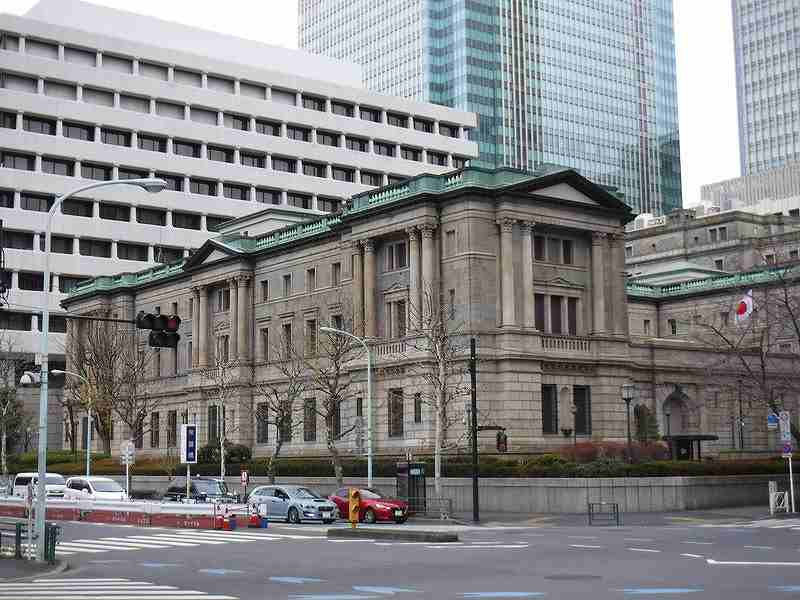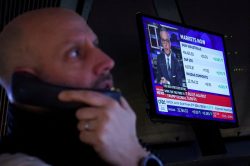
Bank of Japan building in Tokyo
December 13, 2021
TOKYO (Reuters) — Japan’s service-sector mood improved to a two-year high but the recovery among manufacturers stalled, a closely watched central bank survey showed, a sign rising raw material costs was weighing on the economy’s recovery from the pandemic.
Big firms expect conditions to worsen ahead as high fuel prices and a weak yen push up import costs, reinforcing market expectations Japan will maintain massive fiscal and monetary support to underpin a fragile economy.
“Non-manufacturers’ sentiment got a boost from the end to pandemic curbs, while supply constraints hit manufacturers,” said Toru Suehiro, an analyst at Daiwa Securities.
“Overall, business confidence lacks strength with both manufacturers and non-manufacturers expecting conditions to worsen,” he said.
The headline index gauging big manufacturers’ sentiment stood at plus 18 in the final quarter of 2021, unchanged from the previous quarter and below a market forecast for plus 19, the Bank of Japan’s (BOJ) tankan survey showed on Monday.
Rising costs and auto output disruptions hit industries such as non-ferrous metals, chemicals and machinery, it showed.
By contrast, big non-manufacturers’ sentiment improved for the sixth straight quarter at plus 9, up from plus 2 in September and exceeding market forecasts of plus 6.
The index hit the highest level since December 2019, as the Sept. 30 lifting of state of emergency curbs to combat the COVID-19 pandemic boosted morale among retailers.
But the survey, conducted for a month through Dec. 10, likely did not incorporate much the recent spread of the Omicron variant with nearly 80% of the replies coming in by Nov. 29.
Rising raw material costs add to uncertainty by squeezing profits of firms just emerging from the pandemic’s hit.
An index gauging big manufacturers’ output prices rose to levels last seen in 1980, though the gauge for input prices was also at its highest since 2008, the survey showed, a sign firms may struggle to hike prices as much as needed to cover costs.
Companies expect inflation to hit 1.1% a year from now, the tankan showed, marking the highest level since September 2015.
Despite the murky outlook, companies plan to increase hiring and capital expenditure to deal with a chronic labor shortage.
Big firms plan to increase capital spending by 9.3% in the year ending in March 2022, less than market forecasts for a 9.8% gain but rebounding from an 8.3% drop in the previous year.
Japan has lagged other countries in staging a strong rebound from last year’s pandemic hit, shrinking an annualized 3.6% in July-September due to weak consumption and output hit by a spike in infections and supply constraints.
While analysts expect growth to bounce back in the final quarter of this year, some warn the emergence of Omicron clouds the outlook and may keep the recovery feeble next year.
Top Articles in News Services
-

Survey Shows False Election Info Perceived as True
-

Prudential Life Expected to Face Inspection over Fraud
-

Hong Kong Ex-Publisher Jimmy Lai’s Sentence Raises International Outcry as China Defends It
-

Japan’s Nikkei Stock Average Touches 58,000 as Yen, Jgbs Rally on Election Fallout (UPDATE 1)
-

Trump Names Former Federal Reserve Governor Warsh as the Next Fed Chair, Replacing Powell
JN ACCESS RANKING
-

Japan PM Takaichi’s Cabinet Resigns en Masse
-

Japan Institute to Use Domestic Commercial Optical Lattice Clock to Set Japan Standard Time
-

Israeli Ambassador to Japan Speaks about Japan’s Role in the Reconstruction of Gaza
-

Man Infected with Measles Reportedly Dined at Restaurant in Tokyo Station
-

Videos Plagiarized, Reposted with False Subtitles Claiming ‘Ryukyu Belongs to China’; Anti-China False Information Also Posted in Japan
























